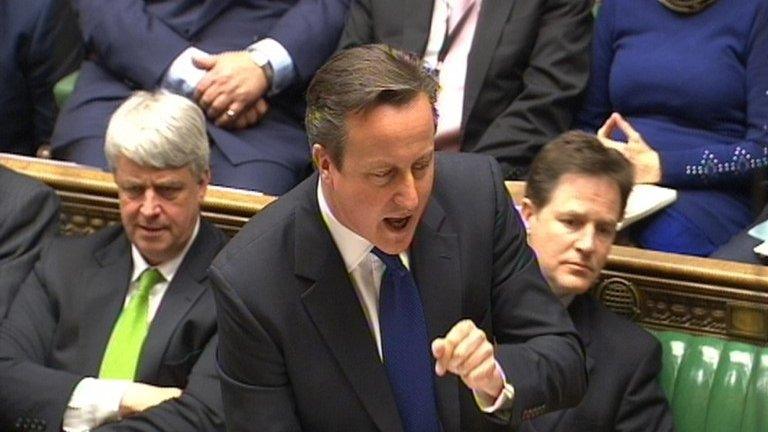Longer waits but Welsh NHS holds its own says UK report
- Published
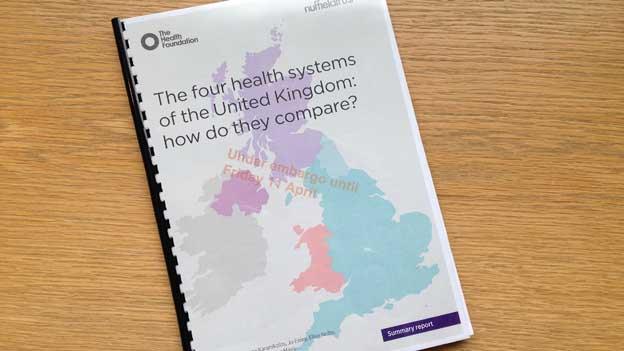
The Welsh government's decision to cut NHS funding may be responsible for longer waiting times, a report claims.
However the study suggests performance has improved in other areas and there is no evidence that Wales is "lagging behind" any other part of the UK.
The research - comparing England, Scotland, Wales and Northern Ireland - shows a significant deterioration in Welsh waiting times since 2009.
This was during an "unprecedented squeeze" on finances.
Health minister Mark Drakeford said Conservative attacks on Wales' NHS were 'unfounded'
Those behind the research claim the performance on waiting times should "set alarm bells ringing amongst policy makers" at a time when governments across the UK are considering how to prioritise spending in a time of austerity.
But across a number of other measures - such as rates of avoidable deaths - the research suggests the NHS in Wales is broadly in line with the rest of the UK or has improved to a "similar level to England".
According to Health Minister Mark Drakeford the study proves Prime Minister David Cameron's recent attacks on the performance of the Welsh NHS had been "utterly unfounded".
"I would say this report shoots Mr Cameron's fox good and proper," he told BBC Wales.
The research, jointly commissioned by Nuffield Trust, external and The Health Foundation, external, also concludes that "the performance gap between England and the rest of the UK has narrowed in recent years" and that "there is little sign that one country is moving ahead of the others consistently across the available indicators of performance".
It also suggests differing health policies, introduced across the UK since devolution, may have had less effect on performance than may have been expected.

WAITING TIMES
In the years leading up to 2009/10, the length of time patients had to wait for a wide range of common procedures improved significantly in Wales and across the UK.
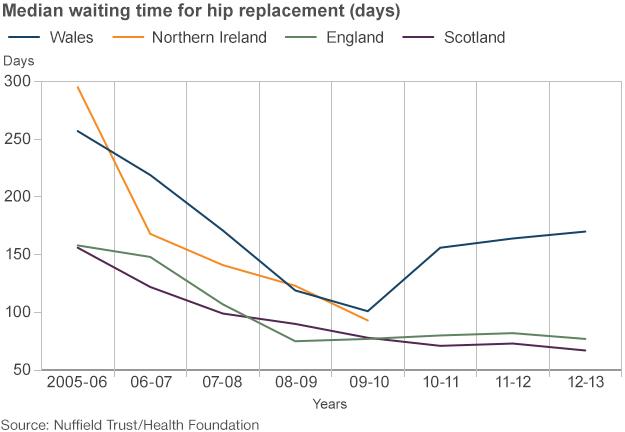
But since then waiting times in Wales, external for many of those procedures have lengthened substantially. This is in contrast to the trends England and Scotland.
The research notes that in 2012/13 patients in Wales waited on average about 170 days for a hip or knee replacement, compared to 77 days in England and 67 days in Scotland.
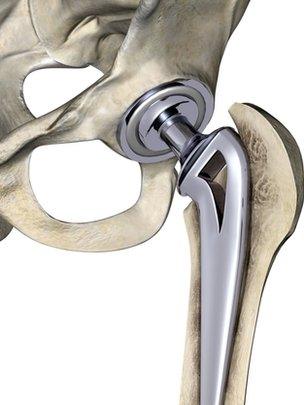
There have been big rises in waits for common procedures such on hips
The study also reveals that 10% of patients in Wales at that time had to wait almost 300 days for a knee or hip replacement, a coronary artery bypass, or removal of a varicose vein.
It also indicated the average Welsh waiting time for a hip replacement had lengthened by 69 days. In 2009/10 the wait was 101. Between 2012/13 it was 170 days.
According to the study, the reasons for the deterioration were "unclear" but it suggests the decision by the Welsh Labour government not to protect its health budget after the last assembly election in 2011 (in contrast England, Scotland and Northern Ireland) may be a contributory factor.
Between 2010/11 and 2012/13 the research notes health spending in cash terms rose by 1% a year in England and Scotland and by 2% a year in Northern Ireland. The NHS in Wales however saw a 1% a year cut.
Previously the Welsh government has claimed that despite the squeeze on NHS spending it has protected its social care budget to a much greater extent than elsewhere in the UK.
The report's authors concede the potential effects or benefits of that decision on social care may not have been reflected in this particular study.

OTHER MEASURES
But beyond waiting times the study suggests the Welsh NHS faces other distinct challenges.
Andy McKeon, senior policy fellow at the Nuffield Trust spoke about the report's findings
During the period under study:
Wales had the fewest number full-time GPs per head of population
In 2010 Wales lagged behind England and Northern Ireland on an important indicator of quality of stroke care (figures for Scotland not available)
However other indicators are more encouraging.
Wales had the second lowest death rates for men and women due to diseases (such as heart disease) which can be treated by healthcare.
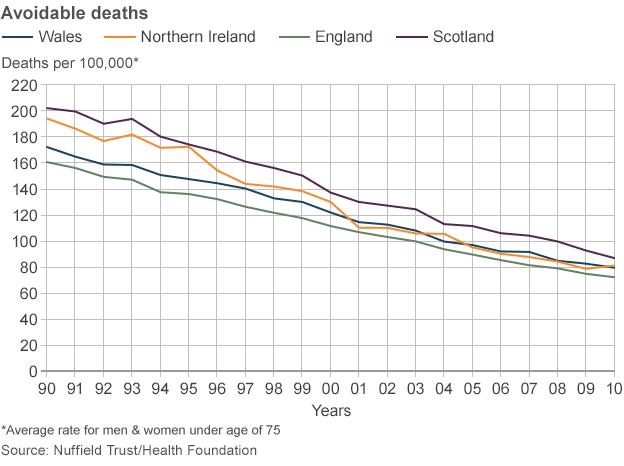
Although worse than in England, the avoidable death rate was lower than in the north east of England which has a similar, but not identical socio-economic profile. The north east has, however, seen a faster rate of improvement.
Meanwhile, life expectancy in Wales, although lower than in England continues to be higher than in Scotland, Northern Ireland, and the north east of England.
The Welsh public seem to be more satisfied with the way the NHS is generally run and about the performance of their GP surgeries than patients in England and Scotland. However Welsh patients have the least positive experience of hospital stays.
And despite long waiting times, more knee replacement operations are performed in Wales per head of population than anywhere else, but fewer varicose vein removals. For gall bladder, coronary bypass, hernia and hip replacements the Welsh NHS is in the middle of the pack.
There is no significant difference, according to the report, between Wales and the rest of the UK when it comes to breast screening, immunisation rates and survival following kidney transplants.

ANALYSIS
With the political row about the state of the Welsh NHS showing no signs of abating, and with each side accusing the other of giving the public a misleading picture about its performance, this report's publication could not have been timed better. So what does the study conclude?
Given the ferocity of the attacks on NHS, the Welsh government will take some comfort from such findings as there is "little sign that one country is moving ahead or lagging behind".
In Prime Minister's Questions on Wednesday, David Cameron claimed yet again that Labour had a "truly dreadful" record on health and that the "shambles" in Wales was in stark contrast to the "well-run" NHS in England.
David Cameron has attacked Labour's record on their management of the NHS in Wales
The critics however will seize on the far more pointed descriptions of Wales' lengthening waiting times where words such as "striking", "disproportionate" and "alarm bells" were used.
They will argue the study demonstrates how thousands of patients have had to wait longer in pain - simply because they live in Wales.
Throughout the report the evidence seems to suggests - broadly speaking - the more you spend - the better the NHS performs.
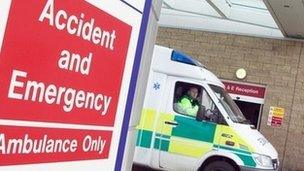
Wales has the worst ambulance response times in the UK
So there will be questions about whether the Welsh government made a mistake in not following the other nations in protecting it's health budget back in 2011.
Was the decision last year to give health a cash injection of over £600m over three years a tacit admission of that?
The health minister says the assembly government chose instead to protect social care to a much greater extent than elsewhere.
That decision he claims is now reaping many benefits - with a fewer numbers of patients in Wales than ever before facing delayed transfers of care from hospitals.

TRENDS ELSEWHERE IN THE UK
Health Foundation chief executive Dr Jennifer Dixon: ''Overall the health system seems to be improving''
The researchers note the following trends in NHS performance across the four nations.
Since undertaking the previous study in 2010 (which used data up to 2006/7) England performs marginally better across a number of key indicators, including avoidable deaths, life expectancy and ambulance response times.
But, the report says the gap has narrowed and differences between the countries are often small. Nurse staffing levels have been lower in England than in the other three countries over the period studied.
Scotland shows a marked upturn in performance on indicators associated with targets and performance management, such as waiting times for planned surgery, which now broadly match England's, and ambulance response times.
Wales demonstrates improved performance on a number of indicators, but shows deteriorating performance on waiting times since 2010, with striking rises in waits for common procedures such as knee or hip operations. In 2012/13 a typical Welsh patient waited about 170 days for a hip or knee replacement compared to about 70 days in England and Scotland.
Northern Ireland has improved performance on most indicators, but MRSA rates remain higher than both England and Wales. There are no comparable waiting time data for Northern Ireland in recent years.
- Published11 April 2014

- Published11 April 2014

- Published11 April 2014

- Published29 December 2013

- Published9 April 2014

- Published2 April 2014
